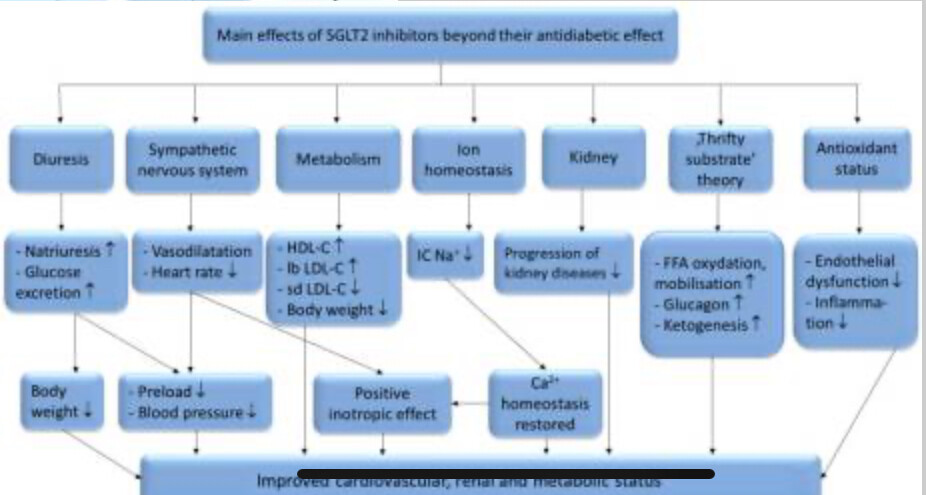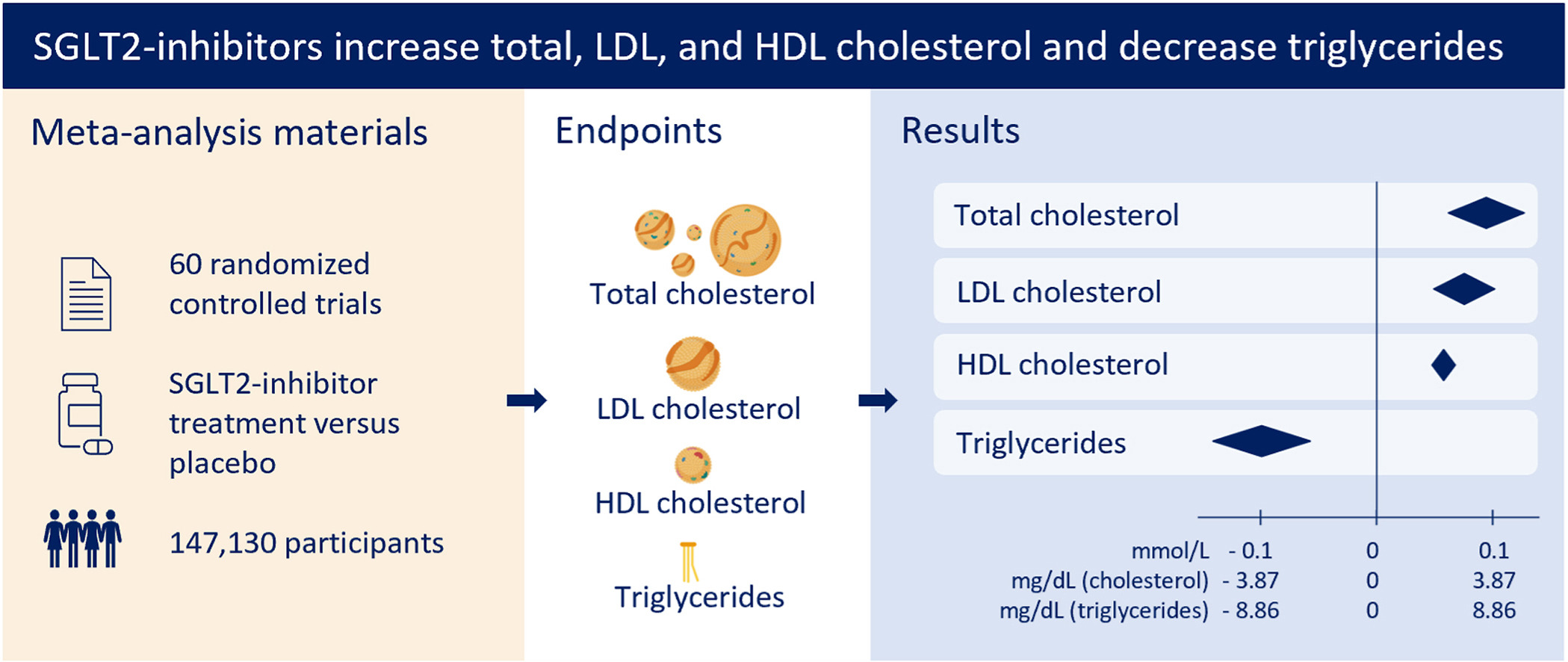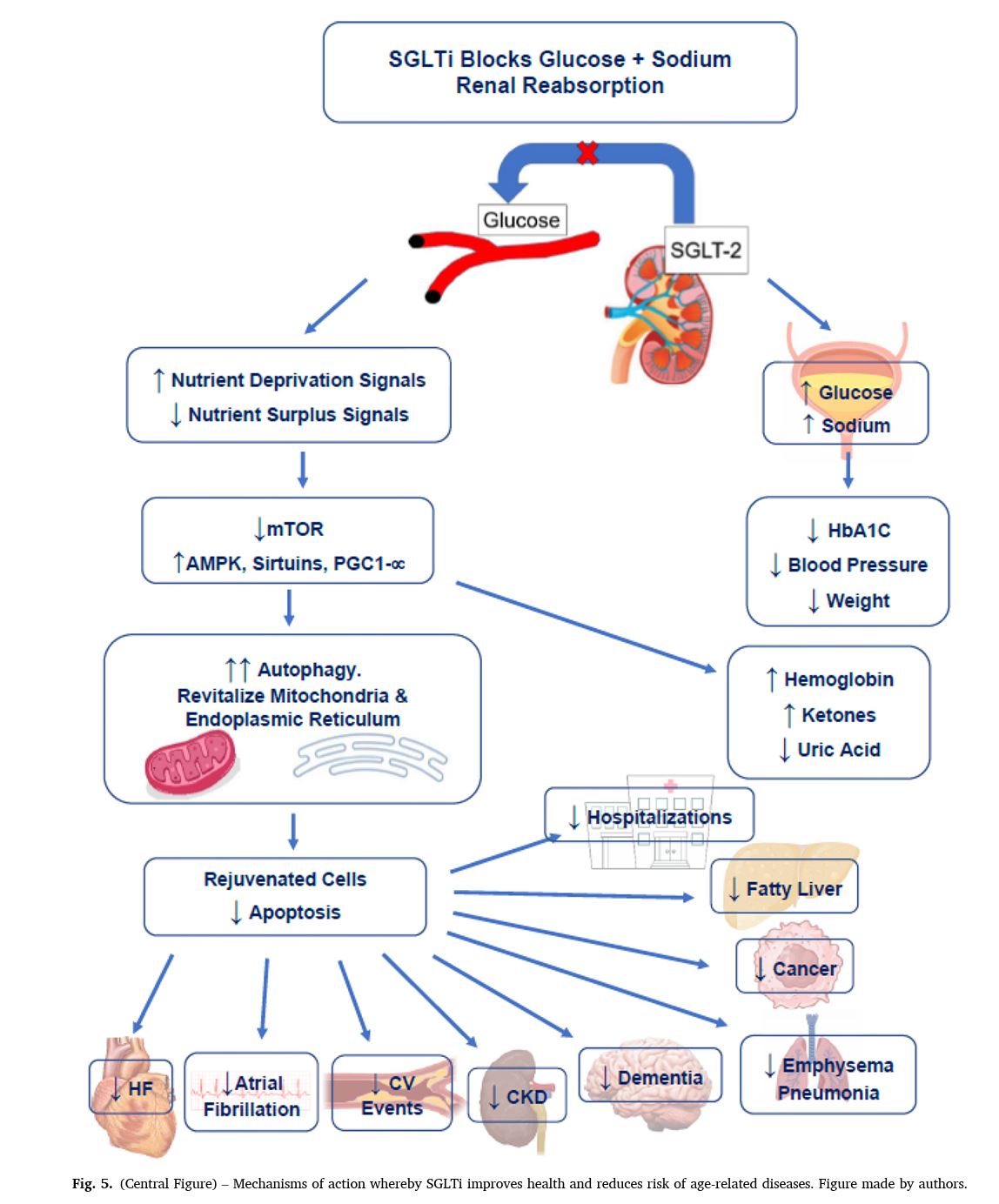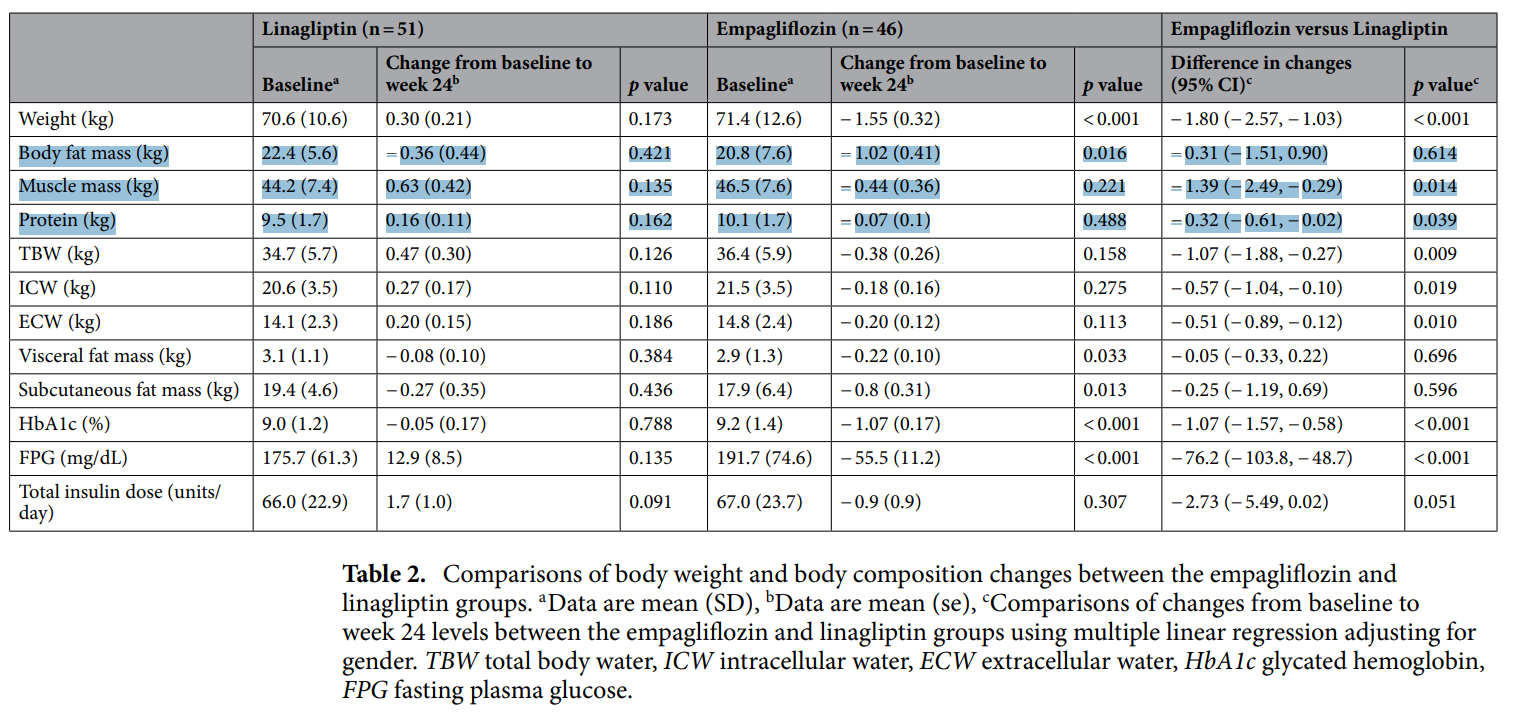Vitamin D deficiency appears to render people more vulnerable to canagliflozin’s adverse effects on bone health, whereas vitamin D3 supplementation appears protective of individuals with vitamin D deficiency.
Interesting overview of SGLT2 inhibitors types and effects.
SGLT2-inhibition increases total, LDL, and HDL cholesterol and decreased triglycerides. Effect sizes varies slightly by drug dose and ethnicity but are generally robust by drug type
https://x.com/ATHjournal/status/1711358851025686542?s=20
https://www.atherosclerosis-journal.com/article/S0021-9150(23)05153-5/fulltext
What about taking a large dose of empaglifozin with a large dose of acarbose as a non diabetic for longevity? currently taking empa 25 and might move up from my acarbose 50. Hopefully these drugs are more about bringing glucose to normalcy than too low
Thanks. Note that the papers intro sections included this synthesis, so a bit different flavor.
Highlights
-
SGLT2-inhibitor treatment increases total, LDL, and HDL cholesterol slightly.
-
SGLT2-inhibitor treatment lowers triglycerides slightly.
-
Higher vs. lower treatment dose had minimal influence on the results.
-
Results were generally robust across different types of SGLT2-inhibitors.
-
Overall, changes were modest and not likely to be of clinical relevance.
—
Personally, after the recent Peter Attia conversation with a top urologist, and my inference, my main concern with SGLT2i is the risks of infections (which are perhaps less common in younger men, but in older men or women seem higher, and in men while more rare on average seem like often a bigger issue than in women when they do occur).
SGLT inhibitors for improving healthspan and lifespan
Sodium-glucose cotransporter inhibitor (SLGTi), initially approved as a glucose-lowering therapy for type 2 diabetes is associated with decreased risks for many of the most common conditions of aging, including heart failure, chronic kidney disease, all-cause hospitalization, atrial fibrillation, cancer, gout, emphysema, neurodegenerative disease/dementia, emphysema, non-alcoholic fatty liver disease, atherosclerotic disease, and infections. Studies also suggest SLGTi improves overall life expectancy and reduces risks of cardiovascular disease death and cancer death. These wide-ranging health benefits are largely unexplained by the modest SLGTi -induced improvements in standard risk factors. SLGTi produces upregulation of nutrient deprivation signaling, while simultaneously triggering downregulation of nutrient surplus signaling. This in turn promotes autophagy—cellular housekeeping whereby senescent and damaged organelles are broken down and recycled, which helps to maintain cellular integrity and prevent apoptotic cell death. SLGTi decreases oxidative stress and endoplasmic reticulum stress, restores of mitochondrial health, stimulates mitochondrial biogenesis, and diminishes proinflammatory and profibrotic pathways. These actions help to revitalize senescent cells, tissues, and organs. Their cumulative effects in preventing premature disease and death suggest that SLGTi may slow aging and improve life expectancy, and its mechanisms of action lend strong biological plausibility to this hypothesis. Further randomized trials are warranted to test whether SLGTi —a safe and well-tolerated, once-daily pill, might improve lifespan and healthspan.
Adverse effects
Any candidate compound being considered for use as a geroprotective agent to improve life expectancy should meet the Primum non nocere (first do no harm) maxim. A compound to be used for decades by healthy people must have very low risk for serious adverse effects. SLGTi are generally well tolerated, with discontinuation rates in RCTs that are similar to placebo (Fig. 4). A network meta-analysis of 47,000 patients in RCTs reported no significant changes in the risk of adverse events
Published online, 17 October 2023
https://www.sciencedirect.com/science/article/abs/pii/S0033062023001068
Antidiabetic Drugs May Prevent Kidney Damage
Introduction: Sodium-glucose cotransporter 2 inhibitors (SGLT2i) are a class of drugs that act as glucose reducers in patients with type 2 diabetes mellitus. Recent meta-analyses have shown that SGLT2i also prevent acute kidney injury (AKI) in diabetic patients. The aim of this study was to investigate the protective effect of canagliflozin an SGLT2i on AKI due to ischemia and reperfusion (I/R) in non-diabetic rats. Methods: Male Wistar rats weighing 250-300 g were divided into four groups: Control; SHAM (rats submitted to surgical simulation of renal ischemia); I/R: rats submitted to renal ischemia (bilateral clamping of the renal hilum for 30 minutes); CANA+I/R: I/R rats that received canagliflozin (30mg/kg, oral, gavage; 5 days before I/R). Renal function parameters were evaluated (serum creatinine [CrS]
Results: The I/R group showed an increase in CrS and a reduction in inulin clearance, while the CANA+I/R group showed a reduction in serum creatinine and an increase in inulin clearance compared to the I/R group. In addition, the CANA+I/R group showed a decrease in oxidative metabolites (FOX and TBARS) and an increase in Nrf2 compared to the I/R group. Conclusion: Canagliflozin treatment prevented the reduction in renal function induced by ischemia and reperfusion. In addition, there was a reduction in oxidative activity due to a decrease in oxidative metabolites and urinary peroxides and an increase in renal tissue thiols and Nrf-2, which is responsible for transcribing antioxidant activity. Therefore, the current study confirmed a relevant renoprotective effect of canagliflozin in the presence of renal ischemia.
Maria de Fatima Fernandes Vattimo, Eloiza Oliveira Silva, Sara Ventura, Camila Lima, Jessica Garcia, Alessandra Oliveira Maia, Juliana Veloso Gusmão, Guilherme Henrique Ferreira Vieira and Carla Djamila de Pina Victoria
bioRxiv. posted 22 October 2023, 10.1101/2023.10.19.563071
Brenzavvy (bexagliflozin) has an obvious cost advantage, especially when obtained locally, over other SGLT2 inhibitors.
Has there been a comprehensive analysis comparing the overall efficacy of bexagliflozin, particularly considering its potential longevity benefits, with Cana and Jardiance?
I’ve tried cana and empa in the past, and they both seemed to make me feel chronically fatigued and seemed to interfere with results from resistance training/muscle hypertrophy, so I’ve dropped SGLT2s for now. It’s a shame because their health benefits appear to be so overwhelmingly positive.
When you are buying meds from India, you should be looking at the highest quality instead of at cost as the cost will be reduced dramatically.
I had the same issue - I found I got it with canagliflozin, but not empagliflozin. So it may just be the medication type…
And I think by quality, since its hard to measure, go with the largest company that hopefully does business around the world… and look the company up on Wikipedia. For example:
Zydus:
Biocon:
Intas:
On the wake of metformin: Do anti-diabetic SGLT2 inhibitors exert anti-aging effects?
Here we propose that SGLT2 inhibitors (SGLT2i), a class of drugs primarily used to treat type 2 diabetes, could also be repositioned as anti-aging senomorphic drugs (agents that prevent the extrinsic harmful effects of senescent cells). As observed for metformin, another anti-diabetic drug with established anti-aging potential, increasing evidence suggests that SGLT2i can modulate some relevant pathways associated with the aging process, such as free radical production, cellular energy regulation through AMP-activated protein kinase (AMPK), autophagy, and the activation of nuclear factor (NF)-kB/inflammasome. Some interesting pro-healthy effects were also observed on human microbiota. All these mechanisms converge on fueling a systemic proinflammatory condition called inflammaging, now recognized as the main risk factor for accelerated aging and increased risk of age-related disease development and progression. Inflammaging can be worsened by cellular senescence and immunosenescence, which contributes to the increased burden of senescent cells during aging, perpetuating the proinflammatory condition. Interestingly, increasing evidence suggested the direct effects of SGLT-2i against senescent cells, chronic activation of immune cells, and metabolic alterations induced by overnutrition (meta-inflammation). In this framework, we analyzed and discussed the multifaceted impact of SGLT2i, compared with metformin effects, as a potential anti-aging drug beyond diabetes management. Despite promising results in experimental studies, rigorous investigations with well-designed cellular and clinical investigations will need to validate SGLT2 inhibitors’ anti-aging effects.
Paywalled Paper:
https://www.sciencedirect.com/science/article/abs/pii/S1568163723002908
Lupin Receives Tentative Approval from U.S. FDA for generic Canagliflozin Tablets
November 23, 2023
Mumbai, Baltimore, November 23, 2023: Global pharma major Lupin Limited (Lupin) today announced that it has received tentative approval from the United States Food and Drug Administration (U.S. FDA) for its Abbreviated New Drug Application for Canagliflozin Tablets, 100 mg and 300 mg, to market a generic equivalent of Invokana® Tablets, 100 mg and 300 mg, of Janssen Pharmaceuticals, Inc. This product will be manufactured at Lupin’s Pithampur facility in India.
Canagliflozin is a sodium-glucose co-transporter 2 (SGLT2) inhibitor indicated:
- as an adjunct to diet and exercise to improve glycemic control in adults with type 2 diabetes mellitus
- to reduce the risk of major adverse cardiovascular events in adults with type 2 diabetes mellitus and established cardiovascular disease
- to reduce the risk of end-stage kidney disease, doubling of serum creatinine, cardiovascular death, and hospitalization for heart failure in adults with type 2 diabetes mellitus and diabetic nephropathy with albuminuria
Canagliflozin Tablets(RLD Invokana®)had estimated annual sales of USD 561 million in the U.S. (IQVIA MAT September 2023).
About Lupin
Lupin is an innovation-led transnational pharmaceutical company headquartered in Mumbai, India. The Company develops and commercializes a wide range of branded and generic formulations, biotechnology products, and APIs in over 100 markets in the U.S., India, South Africa, and across the Asia Pacific (APAC), Latin America (LATAM), Europe, and Middle East regions.
Visit www.lupin.com for more information.
LinkedIn: Lupin | LinkedIn
Facebook: Lupin | Mumbai
Twitter: https://twitter.com/LupinGlobal
I stared taking empagliflozin 10mg. Felt hungry on it at the end of the day - I guess my body guessed there was less calories in me compared to what I ate. Unfortunately I got a fungal infection - an unpleasant but known side effect. I spoke to one of the drug reps for the company and they reassured me this usually a one off thing but hey their job is to sell the product. I think I will have to stop - I think this will happen again as I am on Rapamycin. I may take it if I know I will be eating lots of carbs like pasta but but diet is fairly low carb ( not keto ). I already take metformin long acting so I’m not sure this is for me.
Not sure if others are thinking of sglt2 inhibitors but just letting everyone know there are side effects with these drugs.
Too bad. I have Empagligozin at home since few months and wanting to try it but was afraid of getting bacterial or fungal infection. Now I am even more reluctant to try.
Hope you are ok now and that it wasn’t too unpleasant.
I just want to add to this. I’ve been taking Cana as a longevity agent for about 2 years. Only side effect I’ve had (and continue to have) is if I eat alot of carby foods, my urine smells “sweet”, which is not really a surprise. It also lowered my nighttime glucose level, which for unknown reasons would spike in the middle of the night during sleep before coming down to normal by the AM. (I used a CGM or never would have known this.) I’m not and never was insulin insensitive. Since Cana, I don’t get those nighttime peaks anymore. I’ve gone through a couple of periods where I experienced fatigue, but I can’t attribute it to the Cana; it could have been anything. Both times resolved itself after a couple of months and I haven’t felt that fatigue in several months.
I orignially started with 100mg, 1x day, now I break the 300’s in half and take half (150mg) once each day. When I first started it, I lost about 7 pounds over the ensuing early weeks, now I eat whatever I want and my weight remains consistent, regardless of what I eat or how much I exercise (or not).
From where I sit, the data continues to be encouraging and I have no plans to switch to Empa or anything else…
Does anyone know if it’s safe to split the 25mg Empagliflozin for a half dose? Thanks!
Yes, you can do that.
It seems that Yes…
EMP-25 tablet is relatively a flat elongated tablet making splitting easier . Using preferably a pill-cutter, the patients were shown how to cut the EMPA-25 tablet into two halves
Source: Treatment Outcomes of Graded Dose of Empagliflozin in Type-2 Diabetes: A Real World Study - PMC
More:
- Empagliflozin 25mg tablets. Dispense 45 to last 90d. Take ½ = 12.5mg daily to prevent complications of type 2 diabetes.
- Empagliflozin vs Linagliptin
- I switched from empagliflozin about 3 months ago because I was concerned that empagliflozin might be hindering or even lowering muscle mass gains.
- Since metformin is known to retard muscle mass increases from resistance training, I didn’t need two things slowing the results from resistance training.
- The main difference I have found is that linagliptin does not lower fasting glucose as much as empagliflozin.
FWIW: Linagliptin is about half the price of empagliflozin.
Just something to consider, I am not recommending anything.
- Empagliflozin
- Provides better glycemic control than linagliptin
- Decreases more muscle mass and total body water than linagliptin
- Provides clinically relevant placebo-corrected reductions in HbA1c
- Linagliptin
- Improves insulin secretion
- Reduces glucagon production
- Slows gastric emptying
- Promotes satiety
- Reduces appetite
- Lacks severe hypoglycemia
- Weight neutral
- Well tolerated
- Slows down renal progression
- Improves renal disease
Empagliflozin And Linagliptin (Oral Route) Description and Brand Names - Mayo Clinic.




